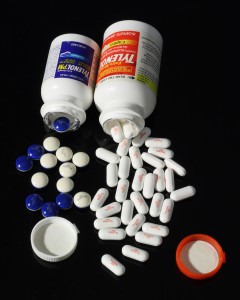 I got my first lesson about the dangers of acetaminophen back in 1980, from a physician specializing in sports injuries. Like many other broke students in the 1980s, I did housework in exchange for a room in a private home. This one just happened to be owned by a doctor and his family. His attitude toward these supposedly harmless pills, more commonly known as Tylenol, was surprising: He refused to let the medicine into his own house and would not prescribe it for any patients. “People have no idea how much damage they can do to themselves with this stuff!” That was the first time I had heard any such warnings. Since then, I have heard a lot more.
I got my first lesson about the dangers of acetaminophen back in 1980, from a physician specializing in sports injuries. Like many other broke students in the 1980s, I did housework in exchange for a room in a private home. This one just happened to be owned by a doctor and his family. His attitude toward these supposedly harmless pills, more commonly known as Tylenol, was surprising: He refused to let the medicine into his own house and would not prescribe it for any patients. “People have no idea how much damage they can do to themselves with this stuff!” That was the first time I had heard any such warnings. Since then, I have heard a lot more.
For years, acetaminophen has been sold to us as the safest pain reliever on the market. However, if you read the information given out by the companies that manufacture the drug, they will admit that in large doses it can be damaging, even fatal. Major studies beginning back in 1994 found that heavy use of Tylenol and other brands of acetaminophen to relieve pain might be the cause of about 5,000 cases of liver failure in the United States each year. In a second study, it was discovered that taking even moderate amounts after fasting could damage the liver. Researchers also found that excessive use of acetaminophen can easily lead to liver damage in people who chronically use alcohol. Alcohol is known to change the way the body metabolizes acetaminophen, and is itself toxic to the liver.
Johnson and Johnson, the parent company for the drug, called all of this news a pointless witch hunt that would frighten the public into taking other pain relievers that were even more dangerous. They down-played the dangers by emphasizing that in prescribed doses, acetaminophen is by far the gentlest choice. Unfortunately, they did not warn just how easy it can be to take up to four times the safe limit without even realizing it. At the time, a dangerous trend was beginning to build: Tylenol was becoming an invasive substance that lurked in places you’d never expect.
Acetaminophen is now an added ingredient in literally hundreds of over-the-counter and prescription drugs. Benadryl, Dayquil, Dristan, Midol, Cepacol, Feveral, Nyquil and Vicks Formula 44 are just a few. Even opioid-type prescription pain killers such as Vicodin are laced with the stuff. If you don’t look, you don’t know and a study in the American Journal of Preventive Medicine found that very few Americans (less than 50%) actually read the labels on over-the-counter medicines. This lack of consumer awareness is responsible for a disturbing fact: Acetaminophen overdose is now the number one cause of liver failure in the United States. The number of cases continue to rise each year.
The dosage limit has recently been lowered by manufacturers to 3,000 mg per day for adults. For children, no more than 420 mg are recommended and for babies, even this much can be a fatal overdose. A single Extra Strength Tylenol contains 500 mg of acetaminophen.
And there is an additional risk factor for overdose in children. The acetaminophen that is made for kids comes in delicious candy flavors. Children who get their hands on a bottle will drink it like syrup or soda and take in a toxic overdose without any idea of what they are doing. Parents who don’t know what their kids have gotten into may not recognize signs of liver damage until it is too late.
Just this week, more possible dangers surfaced. A study of mothers and children in Spain found that boys exposed before birth to acetaminophen were more likely to have symptoms of autism during childhood. Although not conclusive, this study is just one of many to suggest that acetaminophen, widely prescribed to pregnant women, may impact brain development and behavior in children exposed in the womb.
Is acetaminophen safer than aspirin, ibuprofen and other pain relievers? In safe doses, maybe yes, maybe no. Is it known to be dangerous and even fatal in large doses? Definitely YES. Is the average consumer made aware of its prevalence in multiple medications? No.
If you want to protect yourself, learn the facts. Then you decide. And as always, please choose wisely.